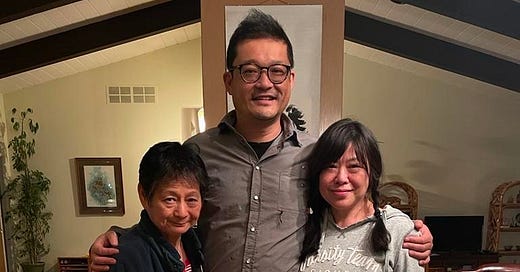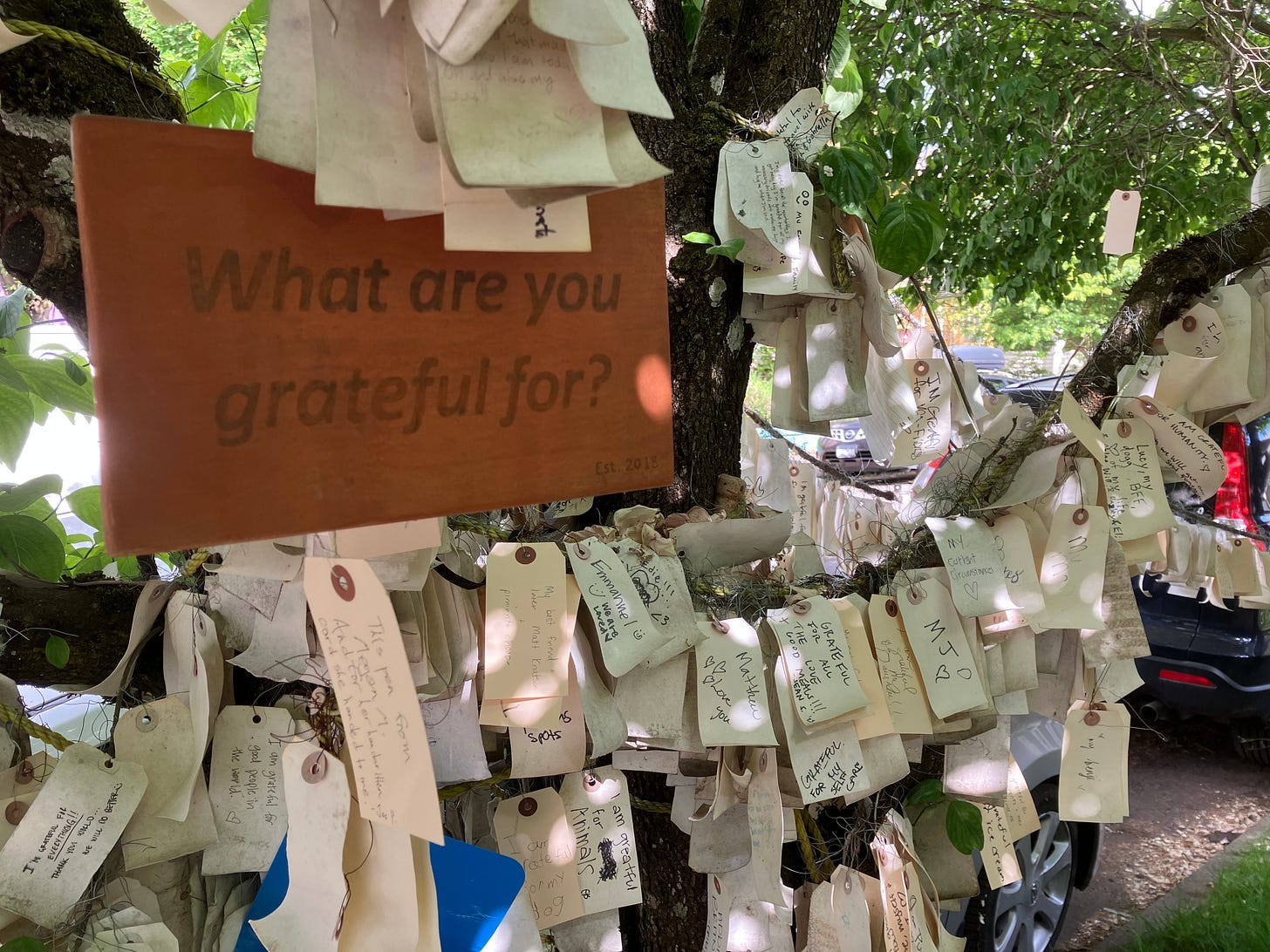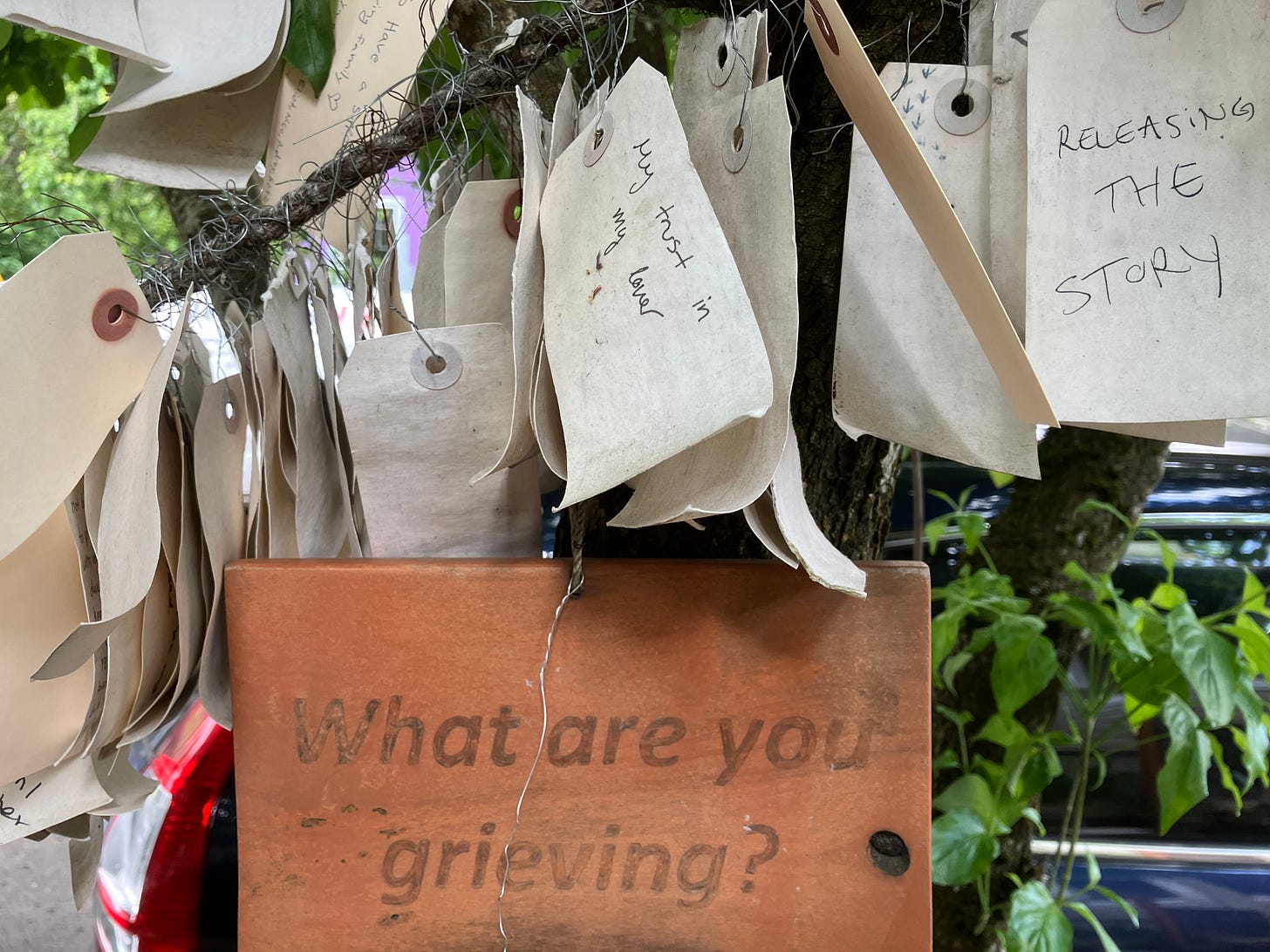I’ve been getting some heartfelt responses from my request to know the wisest person you know. Together, they give a new look into what wisdom is and how it works in our lives. I write about them soon. If you haven’t answered, please click here.
My cousin Kitty
If I had my life to live over again, I would ask that not a thing be changed, but that my eyes be opened wider. - JULES RENARD
Speaking of wise people, I was in Toronto a month ago, visiting my family, and got to spend time with my favorite cousin Kitty. She’s 11 years older than me and the link connecting my fractious family, treating everyone with genuine love, patience, and kindness. I got some driving time with her and asked her how she was able to care for and love our family members, some who are difficult, angry, and unforgiving (traits unsurprisingly I see in myself). How was she able treat everyone with such love and equanimity?
This was (part of) her response:
People would not act that way if they could help it. You just have to be patient and kind.
You just choose to love and listen to them because you made the decision that they are family.
You don’t have to react. You don't take anything personally. That's just the way they are. Everyone is acting in the way they know best. You can't expect them to act differently.
Life is hard for the Tsoi family.
If someone is difficult, they are the ones actually suffering.
My cousin Kitty isn’t “well-educated,” and didn’t get a lot of schooling. She would never write a newsletter called “Money and Meaning.” But in so many ways, she knows so much more than me.
Life is hard
The most poignant thing Kitty said was, “Life is hard for the Tsoi family.” She paused for a moment, and said, “For you too.” I tried to protest, but she pointed out that I didn’t grow up with a mother or father, and that impacted my life, even now. It was an emotional moment for me then, and as I write about it now. No one in my family had ever acknowledged that. I hadn’t acknowledged it myself.
It never occurred to me that I had a hard life. I’ve always thought I was lucky: I was educated and privileged, I got to make career and life choices, including FIRE, that allow me a sense of independence and freedom others don’t. As such, I’ve spent a lot of time cultivating gratitude, in myself, and hopefully for others. I run the Gratitude Dojo and the Appreciation Effect (including writing a whole second newsletter, now on Subtstack). Gratitude is my core spiritual practice, and for many years, I believed it was enough. As Terry Patten said, “Gratitude is universal spiritual wisdom, and it is sufficient.”
Wear gratitude like a cloak and it will feed every corner of your life. — Rumi
But I know however much I practice gratitude but I don’t always feel it. In contrast, my spiritual mentor Terces Engelhart feels grateful every day. I’m faking it until I make it. She’s making it.
But lately I’ve come to believe that gratitude isn’t enough.
Once when I was a junior in high school, I found myself sobbing in the guidance counselor’s office because “these people,” (meaning my fellow classmates), in their vast entitlement, didn’t understand what it felt like to grow up without a mother, be non-white, or not be wealthy. What she told me only makes sense now, many years later in middle age. She said, “Everyone has a hole in their heart where they aren’t enough. For others, it’s if they’re “too fat,” or they didn’t get the car they wanted, or their best friend broke up with them, everyone has the same hole.” What I see now is vast entitlement doesn't protect you from suffering. Having whiteness, wealth, or anything else, doesn’t fill the hole in your heart.
But if my friend Annie Bickerton is right in saying that the point of all of this is finding intimacy with all of Life, then we must fully experience all that is within ourselves to be alive. Including that hole. As Father Richard Rohr says, everything belongs. We must feel gratitude. We must accept pain.
Life has been wonderful. It has also been hard.
For you too?
Grief and gratitude
In front my house I have two trees with signs on them: “What are you grateful for?” and “What are you grieving?” I leave shipping tags and pens for people to contribute. On both trees there are beautiful contributions:
On the back of each sign there is a quote that I shared last week:
“The work of the mature person is to carry grief in one hand and gratitude in the other and to be stretched large by them.” — Francis Weller
Grief and gratitude. As my improv teacher Marilyn Divine taught me, Both/And. Not one without the other.
Everyone in my family has had a hard life. Being displaced and fleeing to a new country across the world, to a foreign culture and foreign tongue is hard. Struggling to make enough money to live is hard. Suddenly being lower status and being looked down upon is hard. Life’s difficulties play out with money: a deep-seated need for security and a dark, visceral fear when it is threatened. An instinctual desire to communicate status and wealth through gifts or consumption. They too, have a hole in their heart.
How do you listen? Do you listen with your projections, through your projection, through your ambitions, desires, fears, anxieties, through hearing only what you want to hear, only what will be satisfactory, what will gratify, what will give comfort, what will for the moment alleviate your suffering? If you listen through the screen of your desires, then you obviously listen to your own voice; you are listening to your own desires.
We never actually listen to anything because our mind is not free. — Jiddu Krishnamurti
In Financial Freedom 1 (next cohort July-August), the first thing we talk about is our money scripts, our unconscious, intergenerational beliefs that we learned in childhood that control our we relate to money. For me, I know my FIRE path was driven by money vigilance. Spending money was never “fun.” If anything spending money created anxiety. From my family history, money was safety and to spend it was to take away my own safety. With a little distance and a little perspective, I see now that the way I lived my personal finances was limited by my consciousness. The way I did things was limited by the way I saw things.
If I had my life to live over again, I would ask that not a thing be changed, but that my eyes be opened wider. — Jules Renard
The most difficult thing about money scripts is that those beliefs are partially true, meaning that we can find evidence to support our beliefs everywhere. Living is easy with eyes closed; misunderstanding is all you see. We try to use money to escape the most impermissible feelings in ourselves, our deepest griefs. In other words, we use money to avoid ourselves. But if we mature into our relationship with money, we realize what it can and cannot do. We can avoid, but we can never escape. And why would we want to? As poet Kahlil Gibran said, “The deeper that sorrow carves into your being, the more joy you can contain.”
Everyone is acting in the way they know best. You can't expect them to act differently.
If someone is difficult, they are the ones actually suffering.
Savoring ripeness
After I wrote about it on my 50th birthday last year, a number of people have asked me to write more about Dark Grace.1 I can’t fully address now it,2 but this from one of my favorite books, "About Alice," New Yorker writer Calvin Trillin's love letter to his deceased wife.
"She wasn’t among those whose response to tragedy or loss was limited to offering the conventional expressions of sympathy before moving on with their own lives. In 1988, an old friend phoned us to say that his grown daughter, a young woman we’d known since she was a child, had been raped by an intruder. This was a dozen years after Alice had been operated on for lung cancer, and among the things that she wrote to our friend’s daughter was that having lung cancer and being raped were comparable only in that both were what she called “realizations of our worst nightmares.” She said that there was some relief at surviving what you might have thought was not survivable. “No one would ever choose to have cancer or to be raped,” she wrote. “But you don’t get to choose, and it is possible at least to understand what Ernest Becker meant when he said something like ‘To live fully is to live with an awareness of the rumble of terror that underlies everything,’ or to begin to understand the line in ‘King Lear’—‘Ripeness is all.’ You might have chosen to become ripe less dramatically or dangerously, but you can still savor ripeness.” Alice had a large envelope in which she kept copies of letters like that—along with copies of some letters she had sent the girls and copies of poems we had written for her on birthdays and documents like the announcement of a prize for community service that Abigail, our older daughter, had been awarded at Yale and an astonishing letter of recommendation that a professor had provided for Sarah, our younger daughter, when she applied for her first job after getting her M.S.W. On the envelope was written “Important Stuff.”"
You don’t get to choose ripeness, but you can savor it. When my friend Annie was facing waves of disturbing emotions during a meditation retreat, her Buddhist teacher told her simply:
“The conditions could not have been otherwise” - Annie’s Buddhist teacher
When we mature, we no longer try to escape the most impermissible feelings within ourselves. We learn what Nisargadatta Maharaj meant when he said, “Nothing ever goes wrong.”
I’ve come to see that whatever pain life has given me, it was mine to carry, and hopefully transmute. As they say, karma. And that involves letting go. Using money as a way to safety, as a path to status, as a substitute for love works. Avoiding thinking about money as a way of escaping reality works too. It truly does. But only for so long. Doing any of this avoids finding intimacy with all of Life. And you can only avoid yourself for so long.
We don’t study money to study money, we study money to study ourselves. If my view on money scripts is correct, we try to use money in every way to buttress our egos and avoid ripening. Our egos want to stay safe, superior, and separate. To wear the mask. It’s the universal pattern. But ultimately, when you forget all your dualistic ideas, everything becomes your teacher, and everything can be the object of worship.3 Ripening is the very thing we were made for. If only we knew what awaited. The freedom of flight. The wonder of wings.
"Love takes off the masks that we fear we cannot live without and know we cannot live within. I use the word love here not merely in a personal sense but as a state of being, or a state of grace--not in the infantile American sense of being made happy but in the tough and universal sense of quest and daring and growth." -James Baldwin
Life is hard for the Tsoi family. Perhaps yours too? Then perhaps you can find a glimmer of forgiveness for others. People would not act that way if they could help it. This includes you. It’s the work of a lifetime. But as Jesuit mystic Pierre Teilhard de Chardin said, trust in the slow work of God. Everyone is just a mirror; there is no Other. The hole in my heart is the same hole in yours because, ultimately, there is only One Hole.
Everyone is acting in the way they know best. You can't expect them to act differently. If someone is difficult, they are the ones actually suffering. This includes you too. Everyone you meet is carrying a heavy burden. You just have to be patient and be kind.
Perhaps this will be the only way you will truly meet yourself.
There is no turning away, only turning in. Receive everything that is within you. Everything belongs.
Nothing ever goes wrong. Life will always be difficult, no matter what entitlements you or I get. We may not get to choose ripeness, but we can savor it.
“…if God is another name for everything, God’s grace is much more complex and paradoxical than we want it to be. Grace isn't just puppy dogs, yummy Asian food, and love from family and friends. Grace is also all the things we don't want and try to push away: the death of a parent, the unmet desire for a partner, the getting fired from a job.”
If you want more now, listen to Elizabeth Gilbert at min 56 talk about the Light after the Darkness after the Light. https://www.goodlifeproject.com/podcast/elizabeth-gilbert-city-of-girls/
Thus said Roshi Shunryu Suzuki







That was pure poetry. Best one yet. Thank you for sharing!
So grateful to be your friend and to make sense of life with your friendship and wisdom along the way.